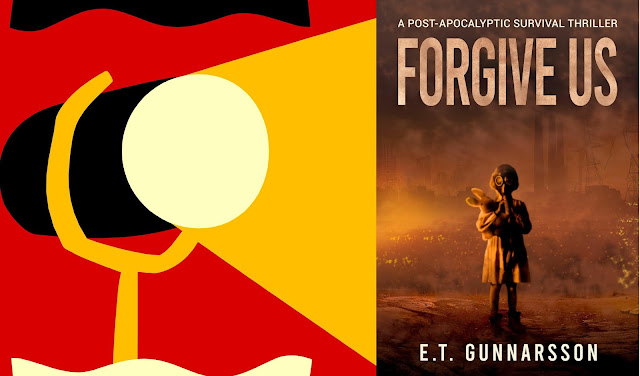In this debut thriller by E.T. Gunnarsson, the war between nature and humanity has no winner. Humanity's drive for energy and technology was its downfall. In a polluted world, survivors fight and endure the world destroyed by their ancestors. From what was left, they will rebuild and struggle to make a better place for their descendants.
Three time periods, four characters, each fighting for their future. Oliver, a lone survivor, raising civilization from the ashes of the wasteland. London and Rose, nomads, forced into the strife between Patria and New Uruk. Simon, a technician on the Arcadis Space Station, joins the revolution against the Leaders. Each trying to survive in a story that intertwines in a new, cruel world.
1. When did
you first realize you wanted to be a writer? Or what first inspired you to write? I was fifteen when I decided to
start writing for real, and it was around that time I started my high fantasy world. A year
later, I started Forgive Us, but I do
not remember what made
me decide to make the book.
Hollow Knight (2017) is another game I played where there’s no real, linear story, but somehow it makes a beautiful world. What makes a good story is hard to decide, and it all depends on how something clicks.
3. How does
a new story idea come to you? Is it an event that sparks the plot or a character speaking to you? A new story idea can
come out of nowhere. I have a short story in the works that was inspired from staring at a shower drain. It sounds ridiculous, but I
think it might be a good story.
For something like my high fantasy world, new stories come
from piecing together a logical history and wanting to tell that history through a character.
4. Is there
a message/theme in your novel that you want readers to grasp? There are a few messages in Forgive Us.
● Another is
that tyranny should not be endured, but rather broken. Regarding tyranny, I also tried to show what real tyranny is, rather than fighting nothing
for no reason.
● The biggest
message in Forgive Us is to consider
the health of the planet. In Forgive Us, there’s a layer of trash below the sands, the ocean is brown and black,
and the sky has a
pollution haze. For the reader, I say just don’t be disgusting about your trash
and recycle. No one appreciates
a plastic bottle on the side of the road.
5. What was your greatest challenge in
writing this book? Again,
discipline. I went weeks occasionally without touching Forgive Us when I was writing it, which is something I
regret now but also was a valuable lesson on work ethic.
This book may have been received free of charge from a publisher or a publicist. That will NEVER have a bearing on my recommendations. As an Amazon Associate I earn from qualifying purchases if you click on a purchasing link below.#CommissionsEarned



No comments:
Post a Comment